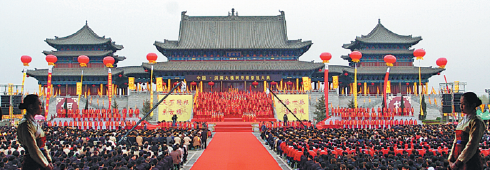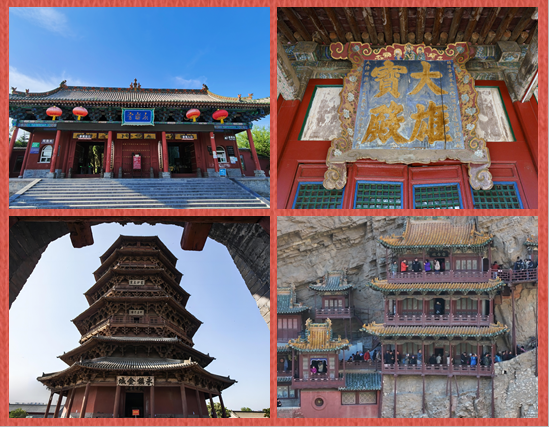Dahuaishu central to worship of ancestors

An ancestral worship ceremony is held at the Dahuaishu Ancestors Memorial Garden in Hongtong county. [Photo by Peng Ke'er/China Daily]
When Qingming Festival, the occasion for worshipping ancestors and sweeping tombs celebrated around April 5, approaches, the township of Dahuaishu in Hongtong county, Shanxi province, welcomes tens of thousands of visitors to pay tribute to their ancestors and seek out their ancestral roots.
Dahuaishu, which means the Big Locust Tree, is where many Chinese people inside and outside the country believe their ancestors emigrated during the Ming Dynasty (1368-1644).
According to historical records, for 50 years in the early Ming Dynasty, there were 18 large migration movements from Dahuaishu township to more than 500 counties in 18 provinces.
These immigrants moved further across the world during the six centuries that followed.
A popular ballad in China reflects the large-scale population movement:
"Where were our ancestors from?
It's the Big Locust Tree in Hongtong.
What is the name of our ancestral residence?
It's the Old Stork Nest under the Big Locust Tree."
The historical evidence can also be found in many family genealogy books and tombstone inscriptions throughout the country, according to Niu Xiaomin, a researcher of folk culture in Shanxi province.
He added that Qingming Festival-with a history of more than 2,500 years-is one of the most popular festivals in China, as Chinese people greatly value ancestral roots and familial piety.
The Dahuaishu Ancestors Memorial Garden in the township is a holy place for many Chinese people across the world and one of the most frequently visited places in the country.
The garden has held the Dahuaishu Ancestors Worship Ceremony every April since 1991 to welcome Chinese people who want to seek their ancestral roots and pay homage to their ancestors there.
Zhang Xinyuan, an elderly resident from the city of Laiwu in Shandong province, arrived in Dahuaishu several days before this year's ceremony.
"Dahuaishu is where our family came. It's a dream for many Dahuaishu decedents to return to their ancestral hometown," Zhang said.
As usual, Zhang said he would collect some soil in Dahuaishu and distribute it to his relatives in Shandong.
"As soil means land, it will be a significant gift to my relatives, which conveys the blessing of our ancestors and reminds them of their homeland," Zhang said.
Ancestral worship has developed into a tradition in Dahuaishu township for hundreds of years and the ancestral worshipping ceremony was included on the national intangible cultural heritage list in 2008.
Peng Ke'er contributed to this story.



